Hwyl fawrpublished at 14:25 BST 9 July 2024
Vaughan Gething’s twelfth session as first minister comes to a close.
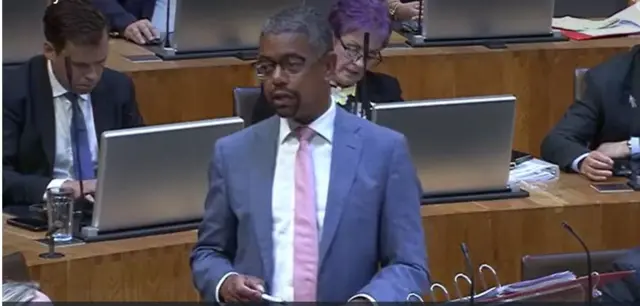 Image source, SENEDD CYMRU
Image source, SENEDD CYMRUVaughan Gething takes questions in the Senedd for the twelfth time as first minister
Alun Jones
Vaughan Gething’s twelfth session as first minister comes to a close.
 Image source, SENEDD CYMRU
Image source, SENEDD CYMRUConservative Tom Giffard expresses concerns about a "tourism tax" in Wales.
He says, "that concern is so widespread it’s, in fact, spread to the new Chancellor, Rachel Reeves, who last week, when asked if she supported the introduction of a tourism tax in Bournemouth said ‘I’m not in favour of making the staycation more expensive than it already is. I want more people to holiday in Britain. I want to support our vibrant hospitality and leisure sector. So, when we’re in the middle of a cost-of-living crisis like we are today, I don’t think it’s the right thing to do.' So, can the first minister explain why a Labour Chancellor in one part of the United Kingdom is saying that this tax would be damaging to our economy and make the staycation more expensive than it already is, and a Welsh Labour government here in Cardiff Bay is pursuing exactly that policy?"
The first minister replies "quite apart from the irony of a Member of the Senedd not understanding devolution, it's worth pointing out that a tourism levy won't come into place until 2027 at the earliest. It will be a permissive power for local authorities to decide what to do, and they will then have choices to make over how to use it. It's worth pointing out that this isn't just common place in many parts of the rest of the world. If you go a sun-and-sand holiday to European destinations, you're probably paying a tourism levy of some sort, if not two different types. If you go to North America, you're almost certainly paying a state and often a city-level levy as well. If you look in the UK, Greater Manchester have used a levy that they've invested in supporting events, to generate more return for their night-time-and-visitor economy. Being creative about how we support the sector is important to understand what sustainable looks like".
The consultation document published by the Welsh government revealed the tax would apply to any visitor, regardless of whether they live in Wales or have travelled from outside, and it would apply to any sort of accommodation, including caravans, motorhomes, holiday lets, and hotels.
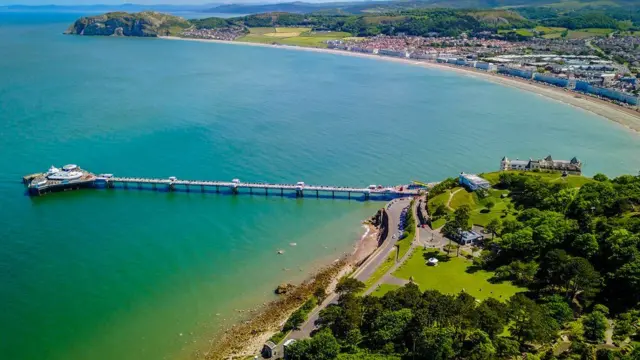 Image source, Getty Images
Image source, Getty ImagesA tourism levy was part of the co-operation agreement between Plaid Cymru and the Labour Welsh government
Conservative Altaf Hussain says "the biggest winner of the general election was apathy".
He adds, "we had one of the worst turnouts ever recorded. My party takes a lot of the blame for that, but so does yours. Far from having a tremendous mandate, your party only secured the support of a third of electorate that bothered to vote".
The first minister replies, "I think people who went to the polls understood their votes really did matter. They made a decisive shift, both away from the Conservatives and understanding that it's the Labour Party in every nation of the UK that represented that change. That's why we now have a majority of Members of Parliament in England, Scotland and Wales for the first time in more than 20 years, and I wouldn't describe having more than 400 Labour MPs in the UK Parliament as a poor result".
In Wales, only 56% of voters filled out their ballot papers, compared to 60% across the UK, and 67% in Wales last time in 2019.
Despite winning the majority of seats, Labour's vote share in Wales actually dropped, down from 40% to 37%.
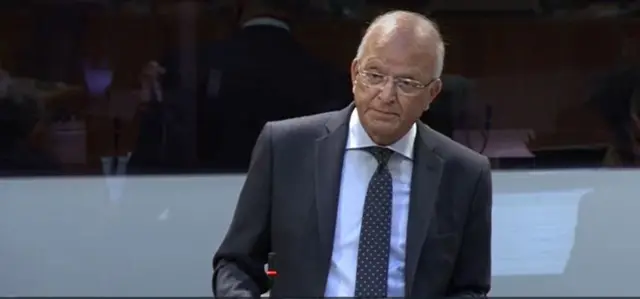 Image source, SENEDD CYMRU
Image source, SENEDD CYMRUAltaf Hussain
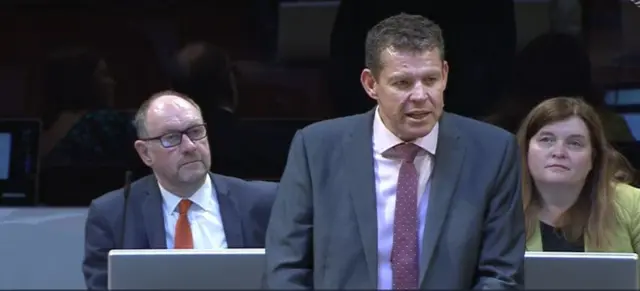 Image source, SENEDD CYMRU
Image source, SENEDD CYMRURhun ap Iorwerth
Plaid Cymru leader Rhun ap Iorwerth questions the new Labour UK government's commitment to devolution, and renews calls for the devolution of the Crown Estate and justice.
Rhun ap Iorwerth says, "new Labour minister Stephen Kinnock, on the BBC over the weekend saying that the Crown Estate should not be devolved to Wales, 'I don't think we need to be overly worried about process, now, moving the pieces around the jigsaw puzzle', he said - kind of a dismissive approach that echoed what the new Secretary of State for Wales said about the devolution of justice being a matter of fiddling around with structures.
"Now, the first minister knows very well that these issues, as well as fair funding and HS2 funding, and so on, are much more than process and structures; they're core matters of fairness. So, did the first minister forget to make an early pitch to the prime minister for a little respect to be shown to Wales, or is the new government already choosing not to listen?"
The first minister replies that the 27 Labour MPs in Wales will be "fantastic champions for Wales."
He adds, "I am keen that we deliver on the manifesto we put before the people of Wales - that will take devolution forward, and it will see real progress across our economy and support for public services and a whole range of areas where a mission for the UK can only be delivered if Wales plays its full part. So, I look forward to not just fairness in funding, but actually, a much better future for all of us here in Wales, and I believe the election of a UK Labour government really will deliver the change that Wales and Britain need".
The Crown Estate is an independent company which belongs to the monarch for the duration of their reign, though the revenue from its £16bn property portfolio flows directly to the Treasury.
The estate's holdings north of the border were devolved to Scotland in 2016, and its revenue now goes to the Scottish government.
The Crown Estate owns the UK seabed out to 12 nautical miles.
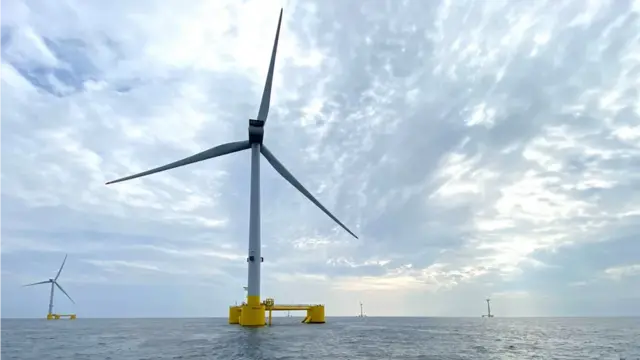 Image source, PRINCIPLE POWER
Image source, PRINCIPLE POWERThe Crown Estate is leasing the seabed under the Celtic Sea to floating wind farm developers
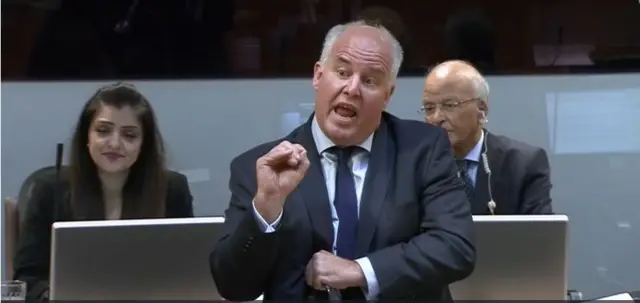 Image source, Senedd Cymru
Image source, Senedd CymruAndrew RT Davies
Andrew RT Davies, leader of the Welsh Conservatives in the Senedd, refers to Sir Keir Starmer's visit to the Senedd yesterday in which the prime minister said he has great concerns over the future of Tata Steel in Port Talbot, where thousands of people are facing redundancy.
Mr Davies asks "can you enlighten the chamber today whether the new UK government has presented a new plan to Tata Steel to secure the longevity of blast furnace 4, so it can stay open as long as possible? And, if that plan has been submitted, what timeline have Tata Steel indicated they are working to to assess it and, ultimately, give you an answer on it?"
First Minister Vaughan Gething replies "we are dealing with a legacy of the previous deal offered by the Conservative government, that Kemi Badenoch celebrated as being good news - that's essentially the plan that Tata are working too - with eye-watering job losses within it, and we are very much at the very end of the line on this".
He added, "we are engaged in good faith negotiations with the company. That is engagement from the Welsh government, myself and the economy secretary engaging directly with Jonathan Reynolds, as the new Secretary of State for Business and Trade, and conversations with the UK and the Mumbai leadership. Those negotiations are on the back of a manifesto that can now be delivered. The £0.5 billion that has not been spent, the £2.5 billion that is available to transform steel across the UK and those negotiations have a limited window over a period of weeks to succeed".
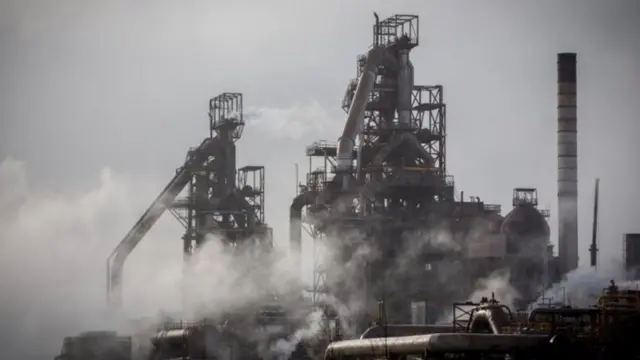 Image source, Getty Images
Image source, Getty ImagesThe first minister says the 2024 National Eisteddfod is likely to benefit the local area by around £22 million.
The Eisteddfod will be held next month in Rhondda Cynon Taf for the first time in almost 70 years.
Mr Gething says "I am proud that the collaboration between us and the Eisteddfod is stronger than ever. By working together, we ensure that everyone, from all backgrounds, can experience our culture and the Welsh language, and I look forward to attending for the first time as first minister".
He adds, "we are deliberately investing money to make sure that people who come from lower income backgrounds can access the Eisteddfod as well. We’ve supported that with £350,000 this year - a genuine statement about the language and the culture belonging to all of us, regardless of our ability in the Welsh language".
He was responding to his Labour colleague Vikki Howells who said she was "keen that we maximise the long-term cultural, educational and economic benefits".
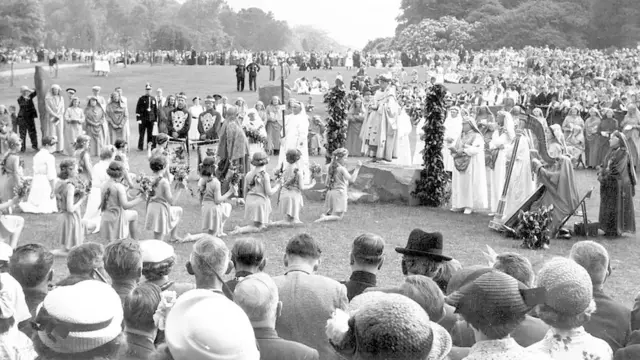 Image source, RHONDDA CYNON TAF COUNTY BOROUGH COUNCIL
Image source, RHONDDA CYNON TAF COUNTY BOROUGH COUNCILThe last time the National Eisteddfod was in RCT was in 1956, at Aberdare
Conservative Janet Finch-Saunders has withdrawn her question seeking "a statement on how the Welsh government interacts with the UK government?"
Yesterday Prime Minister Sir Keir Starmer told journalists it was "very important for me to reset relations with Scotland, Northern Ireland and Wales".
He said there had been "too much" conflict between the UK and Welsh governments over the past 14 years.
He said his election victory was a "gamechanger" which meant Labour governments in Cardiff and London could work together.
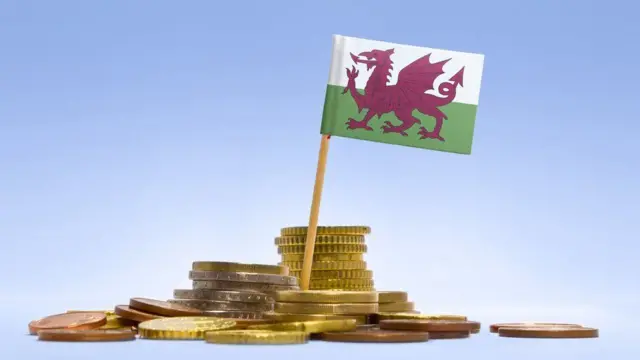 Image source, Getty Images
Image source, Getty ImagesLlywydd Elin Jones conducts a ballot to determine the names of members who may table questions to the first minister.
The first minister is asked by his Labour colleague Mike Hedges to make a statement on the Barnett formula and how it applies to Wales.
Mr Gething replies "the Welsh government has secured important reforms to the Barnett formula in recent years to put its funding on a more sustainable footing. However, the formula remains flawed as a long-term mechanism for allocating funding across the devolved governments within the UK".
Mr Hedges says "we have never given [former first minister] Carwyn Jones enough credit for negotiating the Barnett floor. There’s consensus that it needs changing, but to what? There are two changes that would make Wales substantially worse off, which are population share, or our tax take less our share of the Westminster expenditure. We’ve had piecemeal and asymmetric devolution, which needs addressing".
What is the Barnett formula?
The Barnett formula is a system of grants which dictates the level of public spending in Wales, Scotland and Northern Ireland.
Under it, extra funding - or cuts - from Westminster are allocated according to the population size of each nation and which powers are devolved to them.
When the UK government increases or decreases funding for departments such as health and education in England, the Barnett formula is used to decide how much devolved governments will receive.
The formula is named after its inventor, the former Labour Chief Secretary to the Treasury Joel Barnett.
The Barnett formula was designed in 1978 as a temporary solution to settle rows about government spending allocations.
Lord Barnett never intended his formula to last so long.
Speaking in a debate in the House of Lords in 2010, he predicted that "if we don't do something about it soon the only people who will benefit from this are the people who want to break up the UK, like the SNP in Scotland".
In 2014, shortly before he died, he said the formula was "grossly unfair" and repeated his call for it be scrapped. He also said introducing it was a "terrible mistake" which had become a national and personal "embarrassment".

Lord Barnett in 1986
Hello and welcome to our live coverage of Vaughan Gething’s twelfth session of First Minister's Questions.
The meeting is held in a hybrid format, with some members in the Siambr (Senedd chamber) and others joining by video-conference.
You can click on the play button above to watch the proceedings from 1.30pm.